The Sussex school that trained Nazi girls to marry
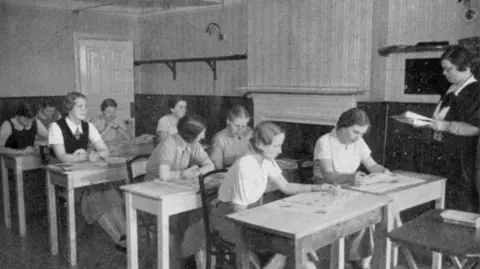 Bexhill Museum
Bexhill MuseumIncredible stories of Great Britain's triumphs in World War Two have been heard as part of the recent 80th anniversary of VE Day.
But some little-known truths also simmer not far from the surface - and lie within the walls of an unassuming block of flats in East Sussex.
Now called Lindsay Hall, the Bexhill building was once the Augusta Victoria College, where daughters of high-ranking Nazi officials and German noble families were trained to marry into the higher echelons of British society.
Julian Porter, curator of Bexhill Museum, said the college aimed to infiltrate British society under the guise of "international friendship".
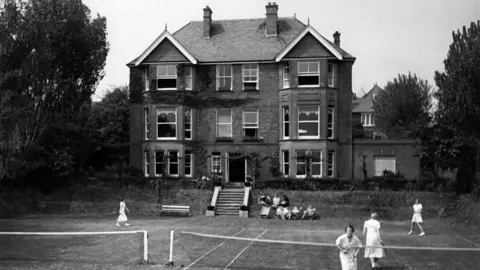 Getty Images
Getty ImagesThe pupils were aged 16 to 21, and Mr Porter, said the college did not just teach English.
"The school aimed to make them eligible for marriage. They were taught etiquette and about English society," Mr Porter explained.
"Hitler wanted to have Nazi-aligned women marrying into British aristocracy and influencing the political class.
"And to make what Germany was doing seem more palatable because Hitler wanted an alliance with Britain."
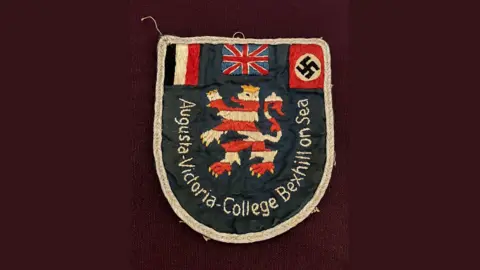 Bexhill Museum
Bexhill MuseumThe school was named after Germany's last Empress - it had a diplomatic mission to forge an alliance between Nazi Germany and Great Britain.
Notable students included Bettina von Ribbentrop, the daughter of Joachim von Ribbentrop, the Minister of Foreign Affairs under the Third Reich.
Others included Isa von Bergen, the daughter of Carl-Ludvig Diego von Bergen who was envoy to the Vatican and Princess Herzeleide of Prussia, the granddaughter of Kaiser Wilhelm II, the grandson of Queen Victoria.
The college was founded by Frau Helena Rocholl, who began accepting German pupils in 1932 before moving into Lindsay Hall in 1935.
'Insidious purpose'
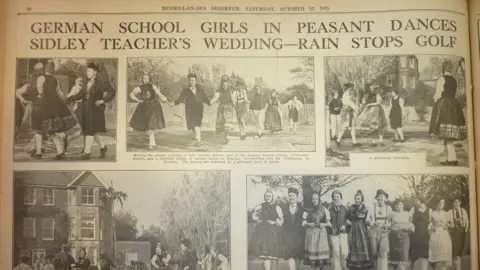 Bexhill Museum
Bexhill MuseumMr Porter said Hitler's vision was to have Britain run the British Empire for him.
In 1936, Hitler contravened the Treaty of Versailles by remilitarising the Rhineland.
Mr Porter said despite Nazi Germany's aggressive stances, there were no suggestions the people of Bexhill showed animosity to the Augusta Victoria College.
He said: "People thought as long as the school and the pupils were there, it meant Germany wasn't going to attack us."
'Bexhill an ideal location'
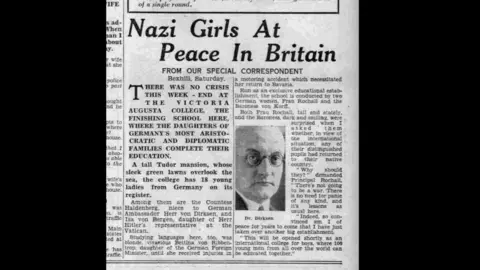 Bexhill Museum
Bexhill MuseumMr Porter said: "Bexhill was renowned for its education industry at the time, and they were mostly private schools for the elite."
This meant students could have greater opportunities to forge connections with British high society.
"Bexhill has historic links with Germany. During the Napoleonic Wars, Britain allied with Germany and the Bexhill Down barracks stationed German troops from 1804 to 1814. So this made Bexhill an ideal location," he added.
The story of Augusta Victoria College inspired a film, Six Minutes to Midnight (2020).
Actor and comedian Suzy Eddie Izzard worked with Bexhill Museum to research the school to write a script for the film.
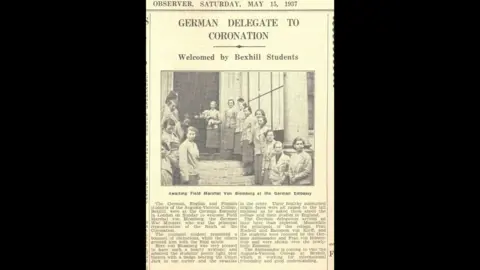 Bexhill Museum
Bexhill MuseumMs Izzard, 63, who grew up in Bexhill, saw the school badge displayed at the museum and she was keen to learn about its history.
Mr Porter said contemporary knowledge of the school was largely based on the account of Mollie Hickie (née Willings), who was the school's au pair from 1935 to 1939.
Ms Izzard interviewed Mrs Hickie, who was British, in 2013 and said she "played down" her Nazi sympathies.
"Mrs Hickie fell in love with one of the students' brothers and she was in Germany when the war started," Ms Izzard said.
Mrs Hickie accompanied the students in 1937 when they visited the German Embassy during King George VI's coronation.
Mrs Hickie admitted in the interview she performed the Nazi salute.
"I think she must have enjoyed it as she got swept up in the atmosphere at the time," Ms Izzard said.
Mr Porter said Mrs Hickie stayed in contact with the girls after they left the school to return home following the outbreak of World War Two.
During the conflict, the Luftwaffe carried out 51 air raids and 12 V1 strikes in Bexhill, according to the museum.
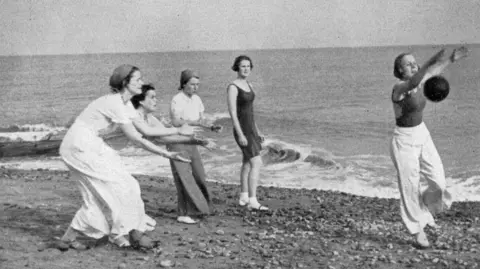 Bexhill Museum
Bexhill MuseumDespite the town's dark history, Mr Porter said it was still important to share the story.
"We tend to think prior to the Second World War, everyone sang from the same song sheet - that everyone opposed Hitler and fascism.
"It was much more complicated than that, there were Nazi sympathisers throughout the country."
At the time, the Great Depression affected every corner of British society.
"People saw what Hitler was doing before the war. They got the impression he sorted out Germany's economy," Mr Porter said.
"Further, the First World War had just ended and people didn't want to have another major conflict."
Follow BBC Sussex on Facebook, on X, and on Instagram. Send your story ideas to [email protected] or WhatsApp us on 08081 002250.
